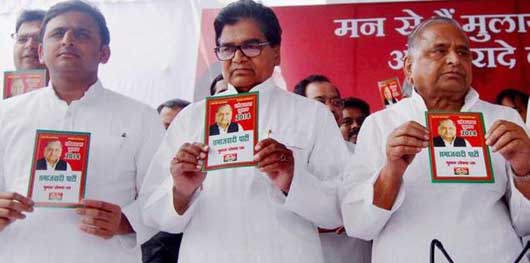Lucknow, Apr 2: Seeking to woo Muslims as well as upper castes, Samajwadi Party today promised quota in police and other government jobs for minority community, release of "innocent" youths jailed on terror charges and constitution of an Upper Caste Commission in its manifesto brimming with sops.
Vowing to enact tough law against communal violence, the SP led by Mulayam Singh Yadav said it would ensure justice to 2002 Gujarat riot victims and implementation of recommendations of Srikrishna Commission.
Provisions for free education and healthcare will be made in the country if a non-Congress, non-BJP government of which SP is a part is formed at the Centre after the Lok Sabha polls, the party, which is in power in Uttar Pradesh, said.
"The party will constitute a commission on lines of women, minorities and others commissions for problems pertaining to Upper Caste. The party will also make amendment in Constitution for providing reservation to Muslims on basis of their population in government jobs and give them 15 per cent reservation in police and PAC," Mulayam said while releasing the party's 24-page manifesto.
"The party will include 17 backward castes in the SC category if voted to power," he said.The manifesto also promised to release "innocent" Muslim youths lodged in jail on terrorism charges.
He also promised to curb corruption and bring back black money from foreign banks.Party National General Secretary Ramgopal Yadav said if SP is voted to power, it would make education free from primary to higher level.
"We will do this by increasing expenditure in education. Presently four per cent of the GDP is spent on education and we will increase it to seven per cent for making education free," Ramgopal said.
For service class, SP manifesto promises increasing the retirement age to 65 years for government employees, judges of higher and lower courts and teachers and other employees of educational institutes.
Priority will be given to Agriculture sector, Mulayam said, adding his government would ensure that the "ignored" sector is given due weightage.
"Only a country, where agriculture is promoted can make progress. China's economy became better than India due to agriculture sector," he said.
Highlighting the steps to be taken in the health sector, the SP supremo said that mini AIIMs would be opened in rural areas and facilities like x-ray, MRI, CT-scan and pathological tests would be made "free for the poor".
"The government will also provide free treatment for kidney, heart, liver, and other diseases including cancer", he said.
Alleging that MNREGA, mid-day meal and nutrition schemes were mired in corruption, he said, "there are scams all over in implementation of this scheme. Somewhere there is small scam and in other place there is big sca...We will change the system".On Naxal problem, Ramgopal said "genuine demands should be accepted instead of using force against them".
To deal with problems of unemployment, Mulayam said that both minor and major industries would be promoted and special economic zone would be created.
The manifesto also promises free insurance of Rs 10 lakh for traders who pay income tax and steps to make VAT more practical.
For checking price-rise, Mulayam said that forward trading would not be allowed and it would be made mandatory that products could not be sold at more than 1.5 times their cost.
"Special monitoring units will also be constituted to keep an eye on corporate houses, ministers and officers to check corruption and corrupt practices," Mulayam said.
The party would remove communal lessons in all the books and also promised to give special status to Bundelkhand and Purvanchal regions of Uttar Pradesh.
Mulayam said that party would effectively implement reservation system and bring private areas in its ambit.
"The officers, who failed to implement reservations, will also be dealt strictly", he added.Criticising the current foreign policy, Mulayam said that relations of India with neighbours were not good, and Indian territory was being encroached upon.
"Our government will ensure bettering relationship with neighbours and st the same time those encroaching on our land will be kept within their limits", he said.
The party manifesto also touched climate change issue with Mulayam saying a panel of experts would be formed to look into it and take necessary steps to save environment.On Naxal menace, Ramgopal said that the solution of this problem was "very easy".
"The solution of Naxal problem is very easy..We have to sit and talk with them. They have nothing to do, their only work of plucking leaves has also been banned. I have solved this problem in parts of Uttar Pradesh in my regime", he said.






Comments
Add new comment